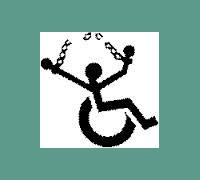Similar topics:
Attached documents
1. DISABLED MEMBERS IN SCOTLAND
2. REFLECTION ROOMS
3. DISABLED PASSENGERS AND TIMETABLE CHANGES
4. CENTENARY OF THE BLIND PEOPLE'S MARCH
5. CONFERENCE CHAIR'S EXPENSES
6. COVID-19, DISABLED MEMBERS AND CARERS
7. ONLINE TRAINING ON DISABILITY
1. DISABLED MEMBERS IN SCOTLAND
Fife & District Branch feel it would be advantageous to have meeting in Scotland 2 weeks prior to the National Disabled Advisory Committee meetings, with its own chair and agenda so as to make it accessible to Scottish members, then representatives of the meeting could attend the National Meeting. We wish that you engage with the NEC to further the benefits of Disabled members in Scotland.
2. REFLECTION ROOMS
We the Fife & District Branch applaud Network Rail for their notification of intention to set up a Reflection Room at Cowlairs Depot, they also have a Reflection Room at the Gyle Depot. In the light of the recent death of a Trackworker at Cowlairs the amenity of a Reflection Room may have saved the day
We therefore instruct the NEC to liaise with Network Rail Scotland to roll out more Reflection Rooms as we believe that Trackworkers are being disadvantaged as the existing Reflection Room is easily accessed by Office based staff.
* Notes: The Committee would like the union to campaign for this throughout the transport industries. Some Committee members found the name ‘reflection rooms’ confusing.
3. DISABLED PASSENGERS AND TIMETABLE CHANGES
Reading Branch notes recent changes made by Great Western Railway which have caused significant hardship to the parents and children, especially those commuting to three school at Aldermaston and that this has exposed a floaw in the national rail planning process.
We are concerned that there is no provision for those with extra needs (as identified using the social model of disability), especially user groups who may have become reliant on a service for many years and are therefore left helpless following a change.
We therefore call upon the RMT to lobby for better consultation by the railway industry when changing timetables, which takes into account local user groups’ needs inclduing using the social model of disability.
4. CENTENARY OF THE BLIND PEOPLE'S MARCH
This conference notes that:
1. in April 1920, the National League of the Blind organised a march from Newport, Leeds and Manchester to London as Parliament debated the economic and social rights of blind people
2. a total of 171 blind workers marched to Trafalgar Square behind a banner that read ‘Justice Not Charity’
3. the National League of the Blind was a trade union, affiliated to the TUC, that fought for the state to take responsibility for blind people’s welfare so they could live independently from charity and poor relief
4. however, legislation supported by the League and other blind people's organisations – the Blind (Education, Employment and Maintenance) Bill – was rejected by Parliament, which instead passed a far weaker law.
This conference believes that:
1. the blind person’s march was an important episode in disability history
2. many of its themes and demands – including independent living, economic and social rights, and ‘justice not charity’ - remain relevant today.
This conference resolves to
1. support events which commemorate this important centenary
2. include an article in RMT News about the march and its relevance today
3. step up our fight for the rights of visually-impaired transport workers and passengers
5. CONFERENCE CHAIR'S EXPENSES
This conference notes that the elected chair performs a role that ensures the smooth and democratic running of this conference, and thus serves the interests of all delegates and of the union's democracy. We further note that in chairing the conference, the chair is unable to act effectively as a delegate from their branch.
This conference therefore believes that it is appropriate for the national union to meet the expenses of the conference chair rather than this falling on their branch
6. COVID-19, DISABLED MEMBERS AND CARERS
DMAC notes:
1. the disproportionate medical impact of Covid-19 on disabled people
2. that the Coronavirus Act infringes on the support needs and civil liberties of disabled people, including by:
- reducing the legal right of children with Special Educational Needs and Disabilities (SEND) to education
- reducing the obligations of local authorities to assess and provide social care
- allowing one doctor (rather than the usual two) to authorise the forcibly detention of a person in mental distress.
3. that there have been several instances of coercion of some categories of disabled people into accepting Do Not Attempt Resuscitation (DNAR) notices
DMAC believes that:
1. the government's prioritising of corporate interests over human life has led to a high number of deaths and continues to risk lives, particularly of groups more vulnerable to Covid-19, such as disabled, black and ethnic minority people.
2. employers refusing to pay full wages to those not at work due to the virus leads to people attending work while sick or vulnerable and puts lives at risk.
DMAC advises RMT to:
1. provide clear advice to members on disability issues related to Covid-19, including to members who are: in the 'extremely vulnerable' group; in the 'vulnerable' group; experiencing increased anxiety; in receipt of social care services and/or live in social care settings; carers for people in any of these groups.
2. demand of employers that they:
- do not coerce disabled workers back to work before it is safe
- do not force disabled workers out of work in response to the Covid-19 crisis or the consequent financial crisis
- ensure that all workers receive full pay when sick, isolating, shielding or furloughed
- ensure that adequate PPE is provided for all workers, and is suitable for disabled workers
- make reasonable adjustments for disabled workers
- ensure that disabled workers, through our elected union representatives, are involved in scrutinising safety measures at work.
3. campaign alongside disabled people's organisations to defend disabled people's travel concessions, for planned accessibility improvements to go ahead and not be sacrificed due to financial problems, and for the restoration of care services and civil liberties.
4. produce its materials in accessible formats.
7. ONLINE TRAINING ON DISABILITY
DMAC notes:
1. the cancellation of all classroom-based RMT training courses due to the Covid-19 pandemic
2. the successful online Disability in the Workplace course run by the DMAC chair (an RMT tutor), using an online 'classroom' and weekly one-hour online discussion, using material from the RMT Disability in the Workplace course.
DMAC believes that:
1. the need for RMT reps and members to receive training on disability issues is no less important during the current crisis that at any other time
2. the most effective online education for RMT reps and members is through courses that are interactive, tutor-led and specific to RMT.
DMAC advises the union to:
1. support and resource the online Disability in the Workplace course to run again
2. support and resource other disability-related courses (eg. Autism, Cancer, Mental Health, Neurodiversity in the Workplace) to run in the same format
3. when lockdown easing allows, to arrange for disability-related classroom courses to be run in regions, especially while the National Education Centre is prioritising core reps' training
4. incorporate disability issues in core training for all reps, including health and safety reps and Union Learning Reps.
- 2105 reads






